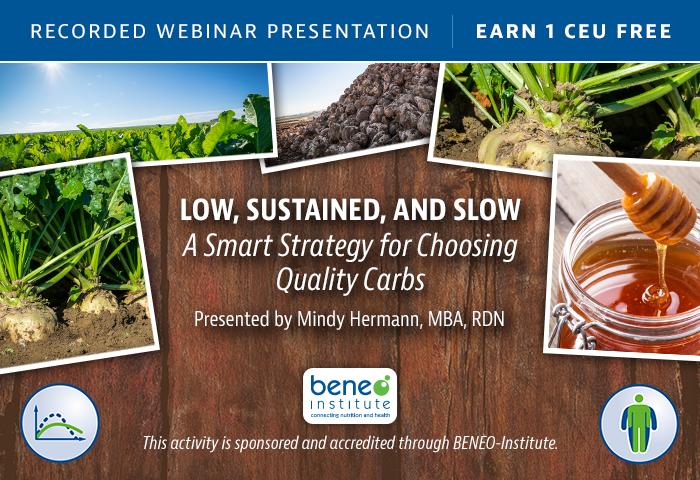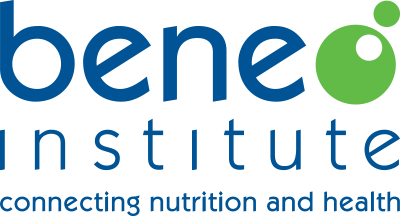Recorded Webinar: Low, Sustained, and Slow: A Smart Strategy for Choosing Quality Carbs

The live version of this webinar was presented on Thursday, May 14, 2020 at 2 pm ET.
The world of dietary carbohydrates has broadened in recent years as manufacturers introduce new carbohydrate ingredients with more nuanced functional properties than their traditional counterparts. These new ingredients differ in blood glucose response, insulin secretion, digestibility, fermentability and ultimately, physiological response and potential health outcomes. Some provide the classic 4 kcal/g and others provide fewer or no calories.
Isomaltulose (Palatinose™) is one of these newer carbohydrates. It is a disaccharide naturally found in honey that resembles sucrose molecularly but is more slowly absorbed. This confers numerous metabolic benefits that are not seen with sucrose consumption, including lowered blood glucose response, sustained energy and higher fat oxidation- making Palatinose™ an attractive alternative to sucrose in certain product categories.
Is it possible today to identify quality carbohydrates by simply reading a nutrition label? Should unique carbohydrate ingredients such as isomaltulose be considered as sugars on the label, or do their metabolic benefits support a different type of classification? This presentation offers guidance to dietitians who are helping consumers better understand sugars and carbohydrates on the label and in the ingredient list.
By registering for this free continuing education course, you are granting permission to Today's Dietitian to share your demographic information and e-mail with the course sponsor for potential marketing purposes.
Learning Objectives
After completing this continuing education course, nutrition professionals should be able to:
- Gain awareness of newer carbohydrates and understand how they fit into the spectrum of carbohydrate types.
- Be able to compare the general molecular structure of different types of carbohydrates and explain how structure affects digestion and absorption.
- Describe the positive and negative metabolic impact among different types of carbohydrates, including isomaltulose.
- Recognize the complexities of educating consumers on added sugars on the label, in light of the unique features of newer carbohydrates.
Additional Information
 Mindy Hermann, MBA, RDN, is an accomplished writer and editor for consumer, industry and medical media. More than 300 trade and consumer credits include articles in food industry, parenting, women’s, and health publicationssuch as Nutrition Today, Nutrition Reviews, American Journal of Clinical Nutrition, Today’s Dietitian, and others.
Mindy Hermann, MBA, RDN, is an accomplished writer and editor for consumer, industry and medical media. More than 300 trade and consumer credits include articles in food industry, parenting, women’s, and health publicationssuch as Nutrition Today, Nutrition Reviews, American Journal of Clinical Nutrition, Today’s Dietitian, and others.
Mindy consults in food and nutrition product and service communications. She creates global market research reports and content on a variety of platforms. Mindy has co-authored a dozen books and has a chapter on communications ethics in the new Academy of Nutrition and Dietetics communications manual.
Mindy began her career at Memorial Sloan-Kettering Cancer Center. She earned a bachelor's degree from UCLA and an MBA from New York University. Mindy is the vice chair of the Academy’s Committee for Lifelong Learning and served as a spokesperson for the New York State and American Dietetic Associations.
Mindy Hermann, MBA, RDN, has the following disclosures to report: she is a consultant for Innova Market Insights and the Danone Institute North America and has done recent work with General Mills and ILSI. She consulted with and received consulting fees from BENEO-Institute to support the preparation and delivery of this program.
 The BENEO-Institute is an initiative of BENEO, one of the world leaders in functional ingredients from nature. It provides latest research and knowledge in nutrition science and legislation related to ingredients such as chicory root fibers, isomaltulose, etc. It was founded by experts in bio-chemistry, nutritional science and regulatory affairs. As consumers’ health consciousness and expectations towards modern food are increasing, the BENEO-Institute started early to focus on the global megatrends.
The BENEO-Institute is an initiative of BENEO, one of the world leaders in functional ingredients from nature. It provides latest research and knowledge in nutrition science and legislation related to ingredients such as chicory root fibers, isomaltulose, etc. It was founded by experts in bio-chemistry, nutritional science and regulatory affairs. As consumers’ health consciousness and expectations towards modern food are increasing, the BENEO-Institute started early to focus on the global megatrends.
BENEO INSTITUTE was approved by the CDR to offer 1.0 CPEU for this webinar.
Available Credit
- 1.00 CDR
Price
Required Hardware/software
Ensure your browser's cookies are enabled in order for the GoToWebcast software to function properly. Please add "[email protected]" to your email provider's safe list. Otherwise, login instructions for this event may be caught in your spam/junk folder.

 Facebook
Facebook X
X LinkedIn
LinkedIn Forward
Forward